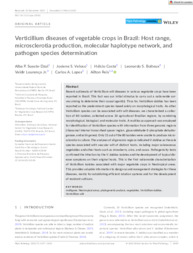Verticillium diseases of vegetable crops in Brazil: Host range, microsclerotia production, molecular haplotype network, and pathogen species determination.
Verticillium diseases of vegetable crops in Brazil: Host range, microsclerotia production, molecular haplotype network, and pathogen species determination.
Author(s): SUASTE-DZUL, A. P.; VELOSO, J. S.; COSTA, H.; BOITEUX, L. S.; LOURENÇO JUNIOR, V.; LOPES, C. A.; REIS, A.
Summary: Recent outbreaks of Verticillium wilt diseases in various vegetable crops have been reported in Brazil. This fact was our initial stimulus to carry out a nationwide survey aiming to determine their causal agent(s). Thus far, Verticillium dahliae has been reported as the predominant species based solely on morphological traits. As other Verticillium species can be associated with wilt diseases, we characterized a collection of 80 isolates, collected across 10 agricultural Brazilian regions, by combining morphological, biological, and molecular traits. A multilocus approach was employed for identification of Verticillium species with information from three genomic regions (ribosomal internal transcribed spacer region, glyceraldehyde-3-phosphate dehydrogenase, and actin genes). Only 21 out of the 80 isolates were unable to produce microsclerotia in culture. The analyses of all genomic regions indicated V. dahliae as the sole species associated with vascular wilt of distinct hosts, including major solanaceous vegetables and other hosts such as trawberry, okra, and cacao. Pathogenicity tests confirmed the infection by the V. dahliae isolates and the development of typical disease symptoms on their original hosts. This is the first nationwide characterization of Verticillium isolates associated with major vegetable crops in Neotropical areas. This provides valuable information to design sound management strategies for these diseases, mainly for establishing efficient rotation systems and for the development of resistant cultivars.
Publication year: 2022
Types of publication: Journal article
Unit: Embrapa Vegetables
Keywords: Doença de Planta, Hortaliça, Vegetables, Verticillium wilt
Observation
Some of Embrapa's publications are published as ePub files. To read them, use or download one of the following free software options to your computer or mobile device. Android: Google Play Books; IOS: iBooks; Windows and Linux: Calibre.
Access other publications
Access the Agricultural Research Database (BDPA) to consult Embrapa's full library collection and records.
Visit Embrapa Bookstore to purchase books and other publications sold by Embrapa.

